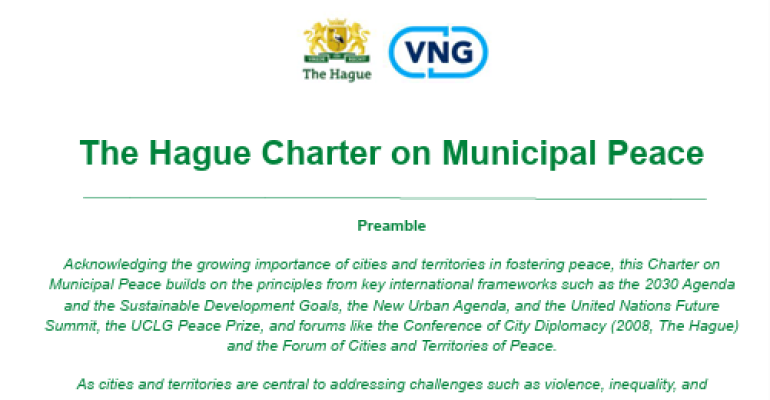Key Role of Cities and Territories in Peacebuilding and Conflict Prevention
At the Municipal Peace Talks in 2024 the The Hague Charter on Municipal Peace was officially launched. Acknowledging the growing importance of cities and territories in fostering peace, this Charter on Municipal Peace builds on the principles from key international frameworks such as the 2030 Agenda and the Sustainable Development Goals, the New Urban Agenda, and the United Nations Future Summit, the UCLG Peace Prize, and forums like the Conference of City Diplomacy (2008, The Hague) and the Forum of Cities and Territories of Peace. As cities and territories are central to addressing challenges such as violence, inequality, and polarization, this Charter outlines an inspiring framework for municipal governments to lead peacebuilding, conflict prevention, and the promotion of inclusive societies.
The Charter consists of four parts:
- Part 1: Preventing Radicalization and Polarization
- Part 2: Tackling Urban Violences
- Part 3: Reducing Disputes between Communities
- Part 4: Migration and Human Mobility
Call to action
This Charter on Municipal Peace highlights the transformative power of cities and territories to build a more peaceful, just, equal, and inclusive world by addressing the root causes of violence, promoting participatory governance, and fostering social cohesion. Violence and conflicts can take many forms but are often linked to socio-economic and cultural injustices and inequalities. The key role of cities and territories in promoting peace and preventing conflicts must be strengthened through their capacity to prevent radicalization and polarization, combat urban violence, reduce disputes between communities, and promote sustainable human mobility. Cities and territories know their own contexts, realities and populations. They have the capacity to find innovative solutions for coexistence and partner with civil society, business community, NGOs, citizens initiatives and a long list of actors. Thus, we need better ways to incorporate the knowledge of cities and territories to national and international debates, forging co-decision systems/schemes that cocreate conditions for peacebuilding and conflict solution. Local governments have the capacity to play a key role in global efforts to prevent conflicts and foster peace; that is so because they know/understand their own communities and contexts better than other spheres of government. It is essential to move towards multi-level governance structures in which local governments actively participate in peacebuilding initiatives. The existence of numerous networks and initiatives highlights the richness and diversity of city diplomacy and decentralized cooperation. Ultimately, this Charter is a call to strengthen the role of local governments in peacebuilding, to advance towards just, inclusive, and peaceful societies, and to unite efforts to safeguard democracy and human rights.
Find the link to the whole The Hague Charter on Municipal Peace here: https://www.vng-international.nl//sites/default/files/The%20Hague%20Charter%20on%20Municipal%20Peace.pdf







